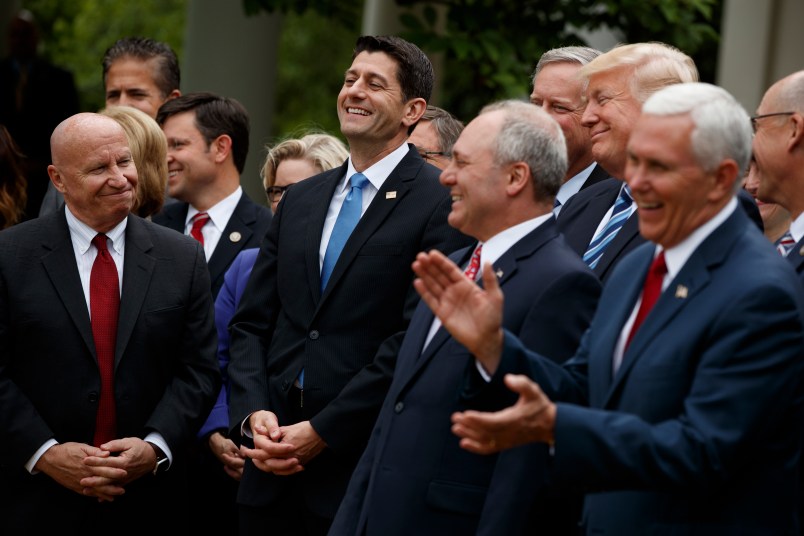Two weeks after its introduction and following zero hearings, the House of Representatives passed an approximately $1.5 trillion dollar tax cut on Thursday. Most of the focus has been on the bill’s tax benefits for the wealthy and corporations, but some lawmakers are sounding the alarm that passage of the bill will also trigger an estimated $25 billion cut to Medicare.
With the Senate expected to take up its own bill after the Thanksgiving recess, Democrats struggling to mount an opposition to the bill see an opening in its controversial health care impacts—including the Medicare cuts, the repeal of Obamacare’s individual mandate, and the elimination of the medical expenses deduction in the House bill.
The Medicare cut—announced by the non-partisan Congressional Budget Office on Tuesday—can only be waived by a majority of the House and a 60-vote supermajority of the Senate.
Thanks to laws created by the Tea Party’s infamous 2010 sequester showdown over government spending, automatic cuts spring into action anytime Congress passes a bill that balloons the federal deficit, as the tax bill would. The approximately $136 billion in cuts spurred by the GOP tax bill would hit a number of government programs—including farm subsidies and the Border Patrol—but would cut most deeply into Medicare. Medicaid, Social Security, and food stamps are protected.
These cuts would violate President Trump’s repeated campaign promises not to touch Medicare and other social safety net programs. But for House Speaker Paul Ryan (R-WI) and other lawmakers who have for decades longed for an opportunity to cut to Medicare and other federal benefits, the cuts would be a feature rather than a bug.
The CBO’s announcement this week has also raised the hackles of the influential AARP, who wrote to Congress on behalf of their 38 million members in opposition to the bill.
“The large increase in the deficit will inevitably lead to calls for greater spending cuts, which are likely to include dramatic cuts to Medicare, Medicaid and other critical programs serving older Americans,” they warned. “The Congressional Budget Office has now published a letter stating that unless Congress takes action, H.R. 1 will result in automatic federal funding cuts of $136 billion in fiscal year 2018, $25 billion of which must come from Medicare.”
Congress could avoid these cuts by waiving the so-called “pay-as-you-go” rules, but it’s unclear whether Republicans or Democrats would see that as being in their political interest. Senators from both parties would have to support the waiver to see it pass the upper chamber. Republicans who regularly rail against runaway government spending may not want to vote against the cuts, and Democrats have suggested they have little interest in bailing out Republicans’ deficit-busting tax bill.
Yet some, including Sen. Chris Van Hollen (D-MD), are already sounding the alarm. In a letter to the House Freedom Caucus on Thursday, he demanded to know if they would vote to waive the budget rules if the tax bill became law.
“This sequestration under Statutory PAYGO would harm Americans across the country,” he said. “Seniors on Medicare might have fewer choices for health care providers. Farmers would suddenly lose the safety net provided by price support programs that help farms stay in business when prices are low. Rural investment would decline due to a loss of support for agricultural research and business loans in rural areas. Meals on Wheels would no longer receive funding from the Social Services Block Grant. People with disabilities would lose the support provided by vocational rehabilitation grants that help them stay in the workforce. And there would be huge disruptions of travel and trade into the United States due to sequestration cuts within Citizenship and Immigration Services and Customs and Border Protection.”







Politicians have no problems , their healthcare is subsidised by the ratepayer.
Just think my fellow citizens, this time next year, we can send the majority of these donor hungry STEPFORD reps to their families permanently!
We will have the POWER to throw all of these bums overboard and let them die a slow death! Because that is apparently what they are wanting to do to us!
This bill will kill millions of hardworking Americans in order to line the pockets of the wealthy with more wealth than in any one place on the face of the earth! This is their race! Well, WE have got to interject OUR RACE TO STOP ALL OF THIS BULLSHIT!
Effect of either House or Senate tax bills on Republican leaders:
Paul Ryan - Wet Dream
Mitch McConnell - evil satisfaction, not capable of wet dream
Trump - family saves billions, doesn’t understand or care about effects on millions of others, and his supporters who lose out will be happy because freedumb
Welfare reset BN’s of the wealthy on the backs of the poor elderly an uninsured. How deplorable! Pay your fair share for once and how many decades.
The wealthy and their entitlements, how deplorable you really are.
I would have preferred a more nuanced story covering all of the program cuts instead of just this story focusing on medicare.